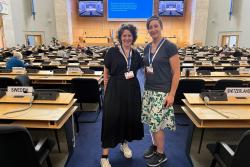Press Release, 15. August 2025
Global Plastics Treaty: What was achieved in the negotiations in Geneva?
From 5 to 15 August, 1,400 delegates from 183 countries negotiated in Geneva accompanied by nearly 1,200 representatives from science, civil society and business to conclude a legally binding global agreement to end plastic pollution within the framework of the United Nations Environment Programme (UNEP). This is because plastic pollution harms the environment, human health, and climate. Marine biologist Dr Melanie Bergmann from the Alfred Wegener Institute, Helmholtz Centre for Polar and Marine Research (AWI) and environmental chemist Prof. Annika Jahnke from the Helmholtz Centre for Environmental Research (UFZ), who were present in Switzerland, assess what was achieved in Geneva and how things will proceed from here. They supported the Scientists' Coalition for an Effective Plastics Treaty and the German delegation during the negotiations.

From left to right: Melanie Bergmann and Annika Jahnke in Geneva
Photo: Laurianne Trimoulla / Gallifrey Foundation

Public actions such as these draw attention to the negotiations in Geneva.
Photo: Annika Jahnke / UFZ
What are the main outcomes of the conference?
Melanie Bergmann: The main outcome is that, unfortunately, once again no agreement was reached. Even the chair's second draft text failed to achieve consensus. From a scientific point of view, it was too weak to effectively combat the plastic problem which affects climate and human and environmental health. In addition, the text fell well short of the original mandate of the UN Environment Assembly. However, this does not necessarily mean that the negotiations have failed. It is better to continue negotiating in order to reach a strong agreement that can address the problem successfully.
What was achieved and what was not achieved?
Annika Jahnke: On the positive side, we saw relatively constructive and substantive negotiations in Geneva. Furthermore, no rigid, weak treaty was agreed on that cannot comprehensively protect the environment and human health. Pollution from plastic and the chemicals it contains is a global problem that does not stop at national borders. Instead, plastic items and the micro and even smaller nanoplastics produced as a result of weathering undergo long-range transport to locations far from their origin via rivers, ocean currents and air, and can therefore be found worldwide. A global agreement is therefore essential.
Why were the negotiations so difficult?
Bergmann: Ultimately, the positions were still too far apart. Particularly controversial aspects were a cap on plastic production and the regulations on the chemicals in plastics. It also seems that it was only in the final hours in Geneva that delegates began to really negotiate on content instead of reiterating their red lines. The member states should now keep the ball rolling and continue discussions in the time ahead of the next negotiation round. We urgently need modern formats for discussion in order to make progress, as the current approach is not leading to success. A strong global agreement would create a uniform set of rules for everyone. Such a level playing field would simplify many things in a global economy, ensure fair competition and open up opportunities for innovation and new technologies.
Jahnke: In addition to these aspects, the discussions also focused on regulations for problematic plastic products, such as single-use packaging, which accounts for almost half of all plastic waste worldwide. Financing of global measures is also an important issue. The previous procedure of discussing individual articles in subgroups was changed shortly before the end of the conference, so that the negotiators from all member states had too little time on the last day to discuss the ‘overall package’ comprehensively and reach consensus on the most important aspects. This new format of discussions could provide a solution for the continued negotiations at an INC5.3, as each side will have to compromise on their ideals and make concessions, which is certainly easier if other aspects are conceded at the same time.
Bergmann: The geopolitical situation is making it increasingly difficult to reach international agreements. Added to this is the growing pressure on oil- and gas-producing countries. Since fewer fossil fuels may be burned in future in order to meet the Paris climate targets, fossil fuels are to be used increasingly as feedstock for plastics. Understandably, these countries will not readily abandon this Plan B, even though it will further fuel the climate crisis and be detrimental to the environment and our health. This makes the negotiation process very difficult.
What could a solution look like?
Jahnke: In response to the global and transboundary pollution from plastics and the associated chemicals, a global agreement is essential. National or regional measures would not go far enough. It may be conceivable to establish a globally applicable basic set of measures for all member states and supplement this with optional additional measures to meet the more ambitious states’ demands. After all, there are well over 100 of these states in the “high-ambition coalition” and their supporters. A two-tier treaty would prevent a patchwork of national and regional measures, which would pose a barrier to innovation and planning reliability for industry.
What happens next?
Bergmann: There will be another round of negotiations. However, the negotiations at INC5.3 will be based on the text from the previous round of negotiations in Busan, since several states did not accept the two new drafts produced over the last two days. Unfortunately, this means that we have not made much progress in terms of substance. However, at least the text components from the articles negotiated in Geneva might be considered. The exact process is still unclear and needs to be finalised in the coming weeks. So far, there have been no signs of a push for a “coalition of the willing” that wants to launch its own ambitious agreement outside of the UN process. We will see if that changes in the future.
Further information
Prof Dr Annika Jahnke
Head of UFZ Department Exposure Science
annika.jahnke@ufz.de
Dr Melanie Bergmann
Marine biologist in the AWI Deep-Sea Ecology and Technology Section
Melanie.Bergmann@awi.de
UFZ press office
Susanne Hufe
Phone: +49 341 6025-1630
presse@ufz.de
In the Helmholtz Centre for Environmental Research (UFZ), scientists conduct research into the causes and consequences of far-reaching environmental changes. Their areas of study cover water resources, ecosystems of the future, environmental technologies and biotechnologies, the effects of chemicals in the environment, modelling and social-scientific issues. The UFZ employs more than 1,100 staff at its sites in Leipzig, Halle and Magdeburg. It is funded by the Federal Government, Saxony and Saxony-Anhalt.
www.ufz.deThe Helmholtz Association contributes to solving major challenges facing society, science and the economy with top scientific achievements in six research fields: Energy; Earth and Environment; Health; Key Technologies; Matter; and Aeronautics, Space and Transport. With some 39,000 employees in 19 research centres, the Helmholtz Association is Germany’s largest scientific organisation.
www.helmholtz.de